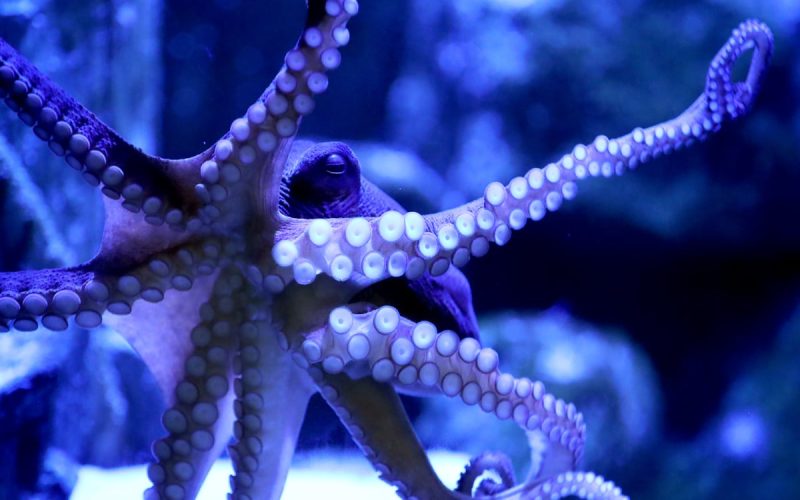It would be terrible to raise octopuses for human eating because they are so intelligent, clever, and have nine brains. They can also utilize tools and identify people.
Earlier this month, a group of octopus fans spoke to a committee of the Oregon Legislature, praising the many amazing characteristics of the popular eight-legged mollusk. Before a single octopus production plant is even proposed, nearly 70 people testified orally or in writing in favor of a bill that would outlaw octopus cultivation in the state.
The group’s mood was summed up by Damascus resident Natalia Neal, who wrote, “I urge you to stand on the right side of history by voting in favor of this bill.”
Rep. Anna Scharf, R-Amity, a member of the committee, has expressed skepticism about many of those passionate pleas, claiming that some of the bill’s arguments—such as the claim that raising octopuses would place an excessive burden on natural resources—were false and motivated by out-of-state groups and individuals who want to outlaw all large-scale meat production.
Scharf, who works on a fourth-generation family farm that grows wheat, hazelnuts, and other crops, added, “I won’t get into a debate about the intellectual ability of an octopus and some of the other things that we kill in our state that have high intellectual capability.”
The Oregon Farm Bureau has also expressed disapproval of the bill, claiming it sets a worrying precedent by outlawing the raising of an entire genus of animal without a convincing scientific explanation.
As a result, the measure has sparked a broad debate that has raised more profound and occasionally awkward concerns regarding the intelligence of the animals that Oregonians consume and the industrial production of meat in a culture where many people are making a commitment to increase their daily protein consumption.
Since octopuses can play games, identify their favorite humans, and recognize human hand signals, are they truly as intelligent as pigs and cows, two of the nation’s most popular meat sources?
In comparison to chicken, pig, beef, or fish, how many resources are needed to produce one pound of octopus?
Given that octopuses are a prized component of many international cuisines, including Asian, Mediterranean, and Pacific Islander, HB 2557 has also spurred discussions regarding cultural prejudice against them as a food source.
Environmental worries
Rep. Zach Hudson, a Democrat from Troutdale, stated that none of that had anything to do with his reasons for supporting the bill.
According to Hudson, this measure has nothing to do with whether or not we should eat octopuses. It concerns whether or whether they ought to be raised in captivity.
Rep. Zach Hudson, a Democrat from Troutdale, stated that he initially believed the proposal to outlaw octopus cultivation was a joke. According to Hudson, the law would not forbid the purchase, sale, or retention of wild octopuses for research or as pets. (Photo taken in January 2025)Graves, Mark/The Oregonian
Hudson stated that his main motivation for becoming a chief sponsor was his worry that farmed octopuses aren’t a sustainable food source due to the abundance of fish and crab they consume and that they may harbor parasites or diseases that could be transmitted to the Oregon coast through wastewater. However, he said that he also envisions octopuses being reared in incredibly terrible conditions in tiny plexiglass tanks stacked one on top of the other if such facilities were permitted.
Hudson informed the House Committee on Agriculture, Land Use, Natural Resources, and Water that a farming enterprise aimed at making the most money would probably cram as many octopuses as possible into tiny, empty tanks.
Although a Spanish company claims to be nearing the completion of the required technology, there are currently no octopus farms in the world that produce food. With its bill, Oregon would become the third state in the US to outlaw this new aquaculture practice, after California and Washington.
According to Rep. Courtney Neron, D-Wilsonville, the bill’s principal co-sponsor, “it’s about putting an end to cruel practices before they begin in Oregon and sending a clear message to other regions that might be considering allowing this practice that the west coastline is unified.”
Pictured here in January 2025 is Wilsonville, D.C. Representative Courtney Neron. Octopuses, she stated at a hearing in February, “are without a doubt one of my favorite animals to learn about.”Graves, Mark/The Oregonian
Given octopuse intelligence, proponents of animal welfare claim they don’t want to debate whether traditional American meat production methods, such raising cattle, pigs, and birds for food, may be more environmentally harmful or morally dubious. They stated that the purpose of this bill is to safeguard octopuses rather than to dismantle established meat producing enterprises.
Amanda Fox, executive director of Animal Rights Initiative, a national charity that is a primary force behind the bill in Oregon and bills in at least six other states, stated that lawmakers shouldn’t really be responsible for forcing people out of business.
Fox added, “This is a preventative issue.” And since we’re having problems regulating the current forms of farming, the majority of people strongly oppose extending farming to another intelligent species.
In Hawaii, where Fox resides, a business has been working to create a method for keeping octopuses in captivity.
Last year, a similar bill before the US Congress failed. One in Hawaii also did so, but supporters this year resubmitted two legislation, both of which passed their initial committee hearings last week.
An octopus moment
Octopuses are obviously having a moment, thanks in part to My Octopus Teacher, the 2021 Oscar winner for best documentary and the 2022 best-selling book.A big Pacific octopus befriends a nightly cleaner at a fictional aquarium in the story Remarkably Bright Creatures.
An legislation recognizing octopuses as sentient beings with feelings and unique personalities was passed by the UK Parliament in 2022. According to the legislation, this also applies to a wide variety of other living things, such as crabs, lobsters, and all animals with backbones, such as mice, pigs, cows, fish, frogs, and chickens.
Observational reports have also shown octopuses squirting water jets at persons they didn’t like or one cunning octopus that crept into another tank to feed on live fish and then closed the lid to hide its tracks. Numerous reports of octopuses using jellyfish tentacles as a potential defense mechanism have been documented.
Researchers have warned against anthropomorphizing octopuses and our understanding of how their brains function, however, as public awareness of their cognitive abilities has grown. Numerous studies have shown that dogs have over 500 million neurons in their cerebral cortex alone, but octopuses have roughly 500 million neurons spread across their nine so-called brains. About 430 million are found in domestic pigs. For contrast, there are 86 billion people on the planet.
It has been suggested that Octopus vulgaris could be raised for food. They have a one to two year lifespan. (Photo of the file)NJ.com’s Lori M. Nichols | NJ Advance Media
However, a 2022 study discovered that a large portion of the octopuse’s neuron power is dispersed in the mini-brains in each of its limbs, which regulate their autonomous movement, in contrast to other mammalian brains. This has sparked conjecture over their capacity for awareness as we understand it.
If a commercial agricultural enterprise ever got off the ground in Oregon, there are still many unanswered questions about what it might look like.
The Spanish business Nueva Pescanova is developing the closest one in the world and plans to construct a facility in the Canary Islands.An outrage was caused by news of the proposed facility in 2022, which included what was perceived as a lengthy and agonizing method of causing their deaths by immersing them in ice baths.
Concerns have also been raised regarding the potential environmental impact of octopus cultivation. According to animal supporters, one pound of octopus meat requires three pounds of fish or crab. In 2024, Nueva Pescanova told NPR that it intended to carefully acquire its feed, such as from fishing waste or other sustainable sources.
Ryan Krabill, a lobbyist for the Oregon Farm Bureau, stated that his agency opposes the effort to halt the start of a whole food production sector. He contends that the Legislature shouldn’t open a Pandora’s box by outlawing the production of particular food sources due to an animal’s intellectual capacity, provided that public health and safety regulations are observed.
Appreciate all animals
However, there has been an overwhelming amount of support for the law. Just four of the more than 70 individuals who filed written testimony or testified during the hearing in early February opposed the plan. Krabill and a woman who believes octopus farming may boost Oregon’s economy were among them.
Those who encouraged the Legislature to take octopuses’ possible future into consideration were far more common.
Sarah Vostal, a resident of Milwaukie, wrote, “These are intelligent creatures that don’t deserve this torture.”
Forest Grove resident Brenda Hess was added: Quit harming all animals. Please respect and adore all animals.
It has been suggested that Octopus vulgaris could be raised for food. (Photo of the file)Nichols, Lori M. | NJ Advance Med
Knowledgeable sources contested some of the testimony.
Octopuses are known to escape due to their extraordinary cognitive abilities, which makes them more likely than any other aquacultured species to spread disease, parasites, and genetic mutations on farms and to wild populations, Fox, the executive director of Animal Rights Initiative, told the legislative committee earlier this month. For instance, several reports state that octopuses at the Seaside Aquarium frequently attempt to escape and are prepared to get hurt in the process.
When challenged by The Oregonian/OregonLive for her source, Fox cited a Trip Advisor remark from 2013 in which a visitor to the aquarium claimed to have seen an octopus swimming into the rock wall in an attempt to swim or escape. Additionally, Fox referenced a 2015 article on the Seaside Aquarium in an online travel magazine that hinted that some octopuses attempted to escape their enclosures more than others.
In his 44 years at the Seaside Aquarium, Keith Chandler, manager, noted that occasionally an octopus has slithered out of its tank out of curiosity or bewilderment.
Chandler stated that they are not planning, strategizing, or attempting to figure out how to hotwire the vehicle and return to the sea.
The aquarium feeds its three octopuses well, so they have no incentive to desire to leave, according to assistant manager Tiffany Boothe. We often give them Dungeness crabs and fresh razor clams.
However, Inky the octopus made news across the world in 2016 after he managed to escape his tank at an aquarium in New Zealand, squeeze down a 50-meter drain pipe, and reach the ocean. Though scientists weren’t sure if the elderly creature was interested, hungry, or going through what experts refer to as senescence—a dementia-like stage of strange behavior and disorientation that octopuses go through before they die—the public questioned Inky’s intentions.
Additionally, Fox said that Oregon’s commercial octopus farms could destroy the state’s crabbing sector by eating more crab than it could produce. However, the Oregon Dungeness Crab Commission has not expressed any opinion regarding the bill. Additionally, Crystal Adams, its executive director, told The Oregonian/OregonLive that, at this time, she does not believe that commercial octopus farming poses a threat.
R-Amity Rep. Anna Scharf.Nakamura, Beth
Scharf’s doubts regarding the necessity of outlawing octopus farming are evident in the minority. During the bill’s hearing, no other lawmaker had an opinion, and the committee’s co-chairs either did not reply to Oregonian/OregonLive’s questions or stated they had nothing to say. Scharf, however, stated to the news outlet that she is prepared to make a statement.
She remarked, “Those things are red flags for me.” The Legislature should, in my opinion, focus on more important issues than outlawing a sector of the economy that is little known and does not even exist in Oregon.
This session, Aimee Green is covering the Oregon Legislature. You can contact her at [email protected] or @o_aimee, or 503-294-5119.
Your support is essential to our journalism. Sign up for OregonLive.com now.
Stories by
Aimee Green
-
I lived being denied menopause care : Oregon lawmaker promotes bill requiring more insurers to cover it
-
Oregon most frightening place to die, with nation s most expansive estate tax, Republicans say. They hope to change that
-
Oregon Republicans share to-do list: End homelessness, lower housing costs, oppose tax increases
-
DAs to lawmakers: Accused child rapist, killers, drug traffickers released from jail as cases stall with no public defenders
-
Avalanche of bills: Oregon lawmakers file record number, spurring concern over bottlenecks










